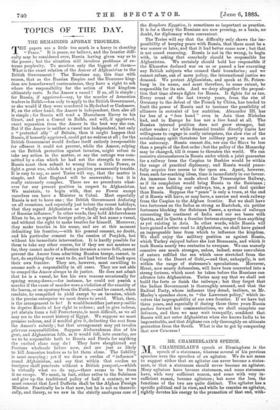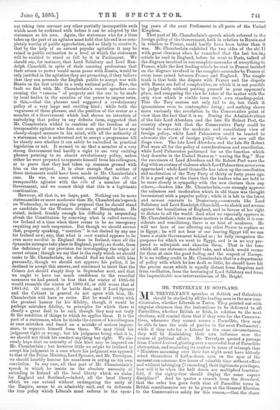MR. CHAMBERLAIN'S SPEECH.
MR. CHAMBERLAIN'S speech at Birmingham is the speech of a statesman, whereas several of his previous speeches were the speeches of an agitator. We do not mean to suggest either that an agitator can never become a statesman, or that a statesman should never become an agitator. Many agitators have become statesmen, and some statesmen have, with very sufficient reason, and some with very insufficient reason, become agitators ; but none the less, the functions of the two are quite distinct. The agitator has a specific political end in view, and while he remains an agitator, rightly devotes his energy to the promotion of that end, with out taking into account any other partially incompatible ends which must be reckoned with before it can be adopted by the statesman as his own. Again, the statesman who for a time takes up the part of an agitator must hold that his end is so completely worthy of public approbation, and so likely to receive it, that by the help of an earnest popular agitation it may be raised in public estimation to a level at which the statesman will be enabled to stand or fall by it in Parliament. We should say, for instance, that Lord Salisbury and Lord Randolph Churchill, in spite of their amusing professions that their return to power would mean peace with Russia, would be only justified in the agitation they are promoting, if they believe that they can persuade the English public to accept war with Russia as the first article in a truly national policy. Now, the fault we find with Mr. Chamberlain's recent speeches concerning the " ransom " of property and the use to be made by local bodies in the counties of the power to impose rates, is this,—that the phrases used suggested a revolutionary policy of a very large and exciting kind ; while both the vagueness of those phrases, and the position of the orator as a member of a Government which had shown no intention of embodying that policy in any definite form, suggested that Mr. Chamberlain wished to combine all the freedom of an irresponsible agitator who does not even pretend to have any clearly-shaped measure in his mind, with all the authority of a statesman who is understood not to accept a programme till he clearly sees whether it can safely be embodied in practical legislation or not. It seemed to us that a member of a very strong Government had hardly a right to use very exciting phrases pointing to an almost revolutionary policy, unless either he were prepared to separate himself from his colleagues, or to prove that they had taken up common ground with him on the subject. It is clear enough that neither of these statements could have been made in Mr. Chamberlain's case. He was, to some extent, combining the role of irresponsible agitator with the nile of a member of the Government, and we cannot think that this is a legitimate combination.
However, all that is, we hope, past. Nothing can be more statesmanlike or more moderate than Mr. Chamberlain's speech
• on Wednesday, in accepting the proposal that he should stand as candidate for the Western division of Birmingham. He stated, indeed, frankly enough his difficulty in suspending afresh the Constitution by renewing what is called coercion for Ireland at a time when there seems to be no emergency requiring any such suspension. But though we should answer that, properly speaking, " coercion " is not desired by any one for Ireland now, nay, that what is most wanted appears to be even more needful in England than in Ireland, since all the dynamite outrages take place in England, partly, no doubt, from the deficiency of our provision for investigating the origin of secret crimes ; though we say that is the reply which we should make to Mr. Chamberlain, we should find no fault with him personally, though we should not approve his policy, if he declined to accept this answer, and continued to insist that the Crimes Act should simply drop in September next, and that we ought to have too much confidence in the remedial measures we had passed to fear that the winter of 1885-86 would resemble the winter of 1880-81, or still worse that of 1881-82. Of course, if he holds that, and if Lord Spencer and the Cabinet in general do not agree with him, Mr. Chamberlain will have to retire. But he would retire with
the greatest honour for his fidelity, though it would be perhaps mistaken fidelity, to principles for which there is clearly a great deal to be said, though they may not truly fit the condition of things to which he applies them. It is the part of a statesman, when he thinks the course of his colleagues at once mistaken and based on a mistake of serious import ance, to separate himself from them. We may think his judgment right or wrong ; but his judgment being what it is, we should not think his conduct anything but right. We sin cerely hope that no necessity of this kind may be imposed on Mr. Chamberlain ; but however little we might be inclined to accept his judgment in a case where his judgment was opposed to that of the Prime Minister, Lord Spencer, and Mr. Trevelyan, we should heartily honour his manliness in acting on his own conviction. In any case, all that part of Mr. Chamberlain's speech in which he insists on the absolute necessity of extending to Ireland all the local liberty which we claim for England and Scotland,—indeed, all the local liberty which we can extend without endangering the unity of the Empire, seems to us admirably said, and to delineate the true policy which Liberals must enforce in the open ing years of the next Parliament in all parts of the United Kingdom.
That part of Mr. Chamberlain's speech which referred to the foreign policy of the Government, both in relation to Russia and in relation to France, could hardly have been better than it was. Mr. Chamberlain exhibited the two sides of the shi(11 with great clearness when he remarked that the last lerteing, article he read in England, before he went to Paris, talked of the disgrace involved in our complete surrender of everything to France, while the first leading article he read in France insisted on the disgrace involved in the complete surrender by France of every issue raised between France and England. The simple truth is that both the dispute with France and the dispute with Russia are full of complexities, on which it is not possible to judge fairly without putting yourself in your opponent's place, and comparing the view he takes of the matter with the only view which is visible from one's own standing-point. This the Tory orators not only fail to do, but think it ignominious even to contemplate doing ; and nothing shows more curiously the revolution in the Conservative point of view than the fact that it is so. During the Administrations of the late Lord Aberdeen and the late Sir Robert Peel, the country always felt that the Conservative Party could be trusted to advocate the moderate and conciliatory view of foreign policy, while Lord Palmerston could be trusted to advocate the view of foreign policy which we now call the Jingo view. The late Lord Aberdeen and the late Sir Robert Peel were all for the policy of considerateness and conciliation, while Lord Palmerston performed for us the function which they describe in the United States as" waving the flag." Now the successors of Lord Aberdeen and Sir Robert Peel wave the flag with an ecstasy of violence which Lord Palmerston never even approached ; while Lord Granville has taken up the conciliation and moderation of the Tory Party of thirty or forty years ago. It is a good sign of the times that the leaders who are held to be more closely in sympathy with the new electors than any others,—leaders like Mr. Chamberlain,—so strongly approve the calmness and moderation which in old times was thought inconsistent with a popular policy ; while it is left to the latest and newest converts to Democracy,—converts like Lord Salisbury and Lord Randolph Churchill,—to shriek and scream against the humiliation of England, and in favour of her right to dictate to all the world. And what we especially approve in Mr. Chamberlain's tone on these matters is that, while it is considerate and conciliatory, there is no hint of weakness. Ho will not hear of our allowing any other Power to replace us in Egypt ; he will not hear of our leaving Egypt till we can leave a stable Government behind us ; he fully recognises the purposes for which we went to Egypt, and is in no way prepared to relinquish and abandon them. That is the tonewhich all our statesmen should take, and which would secure• for them at once the good feeling and the respect of Europe. It is no trifling credit to Mr. Chamberlain that in a department of policy with which he has dealt so little, he should have hit the precise mean which is equally distant from Jingoism and from vacillation, from the hectoring of Lord Salisbury and from the impracticable non-interventionism of Mr. Bright.



































 Previous page
Previous page